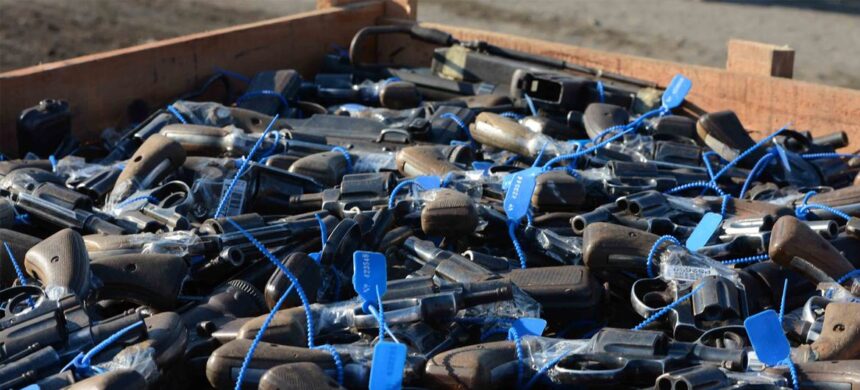According to UN experts, some of Haiti’s gangs possess larger arsenals than the police, fueling their growth by becoming “stronger, richer and more autonomous”. This worrying trend reveals the growing power of criminal groups in the country, fueled by arms trafficking.
Some Haitian gangs have larger arsenals than the police, as criminal groups become “stronger, richer and more autonomous” by using arms trafficking to fuel their growth, according to UN experts.
This situation has plunged the Caribbean nation into a permanent and unprecedented political and humanitarian crisis.
Currently, there are “unprecedented levels of lawlessness”, UNODC regional representative Sylvie Bertrand told the UN news agency.
From Russian AK-47s to American AR-15s and Israeli Galil assault rifles, an increasingly sophisticated arms trade has taken hold of Haiti since 2021, the United Nations Office on Drugs and Crime (UNODC) said in its latest report on the illegal arms trade in Haiti.
Many of these illegal weapons are behind recent reports of random sniper attacks, mass looting, kidnappings and prison attacks to free thousands of detainees, resulting in the displacement of more than 362,000 Haitians fleeing the violence, the UN said in a report published Saturday on its website.
According to Robert Muggah, independent expert and author of “Haiti’s Criminal Markets”, certain gangs are using arms trafficking to extend their influence and claim strategic locations (zones), hampering efforts to halt the illegal entry of a growing number of weapons.
“The situation in Haiti is very disconcerting and worrying, probably the worst I’ve seen in over 20 years of working in the country,” said Mr. Muggah.
Trafficked mainly from the United States, these “lethal arsenals” mean that gangs have “firepower that exceeds that of the Haitian national police”, according to the UN panel of experts tasked with monitoring the sanctions imposed by the Security Council on Haiti in 2022, in the face of worsening armed gang violence.
The problem is that the more weapons come in, the more the gangs extend their control over strategic points such as ports and roads, making it even more difficult for the authorities to prevent arms trafficking, said UNODC’s Ms Bertrand.
Some of the consequences of endemic gang violence are evident in Haiti.
A UN-backed analysis found that nearly half of Haiti’s 11.7 million citizens are in need of food aid, and mass displacement continues as people flee their usual homes for safety.
Hospitals are reporting a sharp rise in the number of deaths and gunshot wounds.
“The growing number of weapons in circulation and the modernization of arsenals are having an impact on the lethality and severity of wounds inflicted,” Haitian medical staff told the UN group of experts.
An estimated 150 to 200 armed groups are currently operating in Haiti, a country that shares the island of Hispaniola with the Dominican Republic, said Muggah, who is an independent security and development expert.
At present, some 23 gangs operate in the Port-au-Prince metropolitan area, divided into two major coalitions: G-Pèp, led by Gabriel Jean Pierre, known as Ti Gabriel, and G9 Family and Allies, led by Jimmy Chérizier, known as Barbecue, said the UN experts who analyzed the situation in Haiti.
In recent months, the two rival factions have joined forces “in coordinated attacks” targeting the airport, the National Palace, the National Theater, hospitals, schools, police stations, customs offices and ports, “forcing their will and expanding their territory”, they explained.
“The gangs actually control very strategic areas of the capital and the main roads linking Port-au-Prince to the ports and land borders, as well as the cities and coastal areas, where a lot of trafficking takes place”, said Mr. Muggah.
Arms trafficking is a highly lucrative business, even in small quantities, as demand for weapons is growing and prices are high, the group of experts noted, citing as an example a 5.56 mm semi-automatic rifle costing a few hundred dollars in the USA is regularly sold for between $5,000 and $8,000 in Haiti.
The experts also noted the presence of “ghost guns”, which are manufactured by private individuals with relative ease by buying spare parts online, thus avoiding the control processes that apply to factory-made firearms. These weapons are not serialized and are therefore untraceable.
According to the UNODC report, a small number of Haitian gangs are highly specialized in the acquisition, storage and distribution of weapons and ammunition.
Most of the firearms and ammunition brought into Haiti, either directly or via another country, originate in the United States, UNODC’s Ms Bertrand recalled, adding that weapons and bullets are generally purchased from licensed retail outlets, gun shows or pawnshops, and shipped by sea.
Suspicions have also emerged about illegal operations involving unregistered flights and small airports along Florida’s southern coast, as well as the presence of clandestine airstrips in Haiti, she added.
The UNODC has identified four trafficking routes using Haiti’s porous borders, two from Florida via cargo ships to Port-au-Prince and to the north and west coasts via Turks and Caicos and the Bahamas, and others via container ships, fishing boats, barges or small aircraft arriving in the northern city.
The international community has a crucial role to play in tackling this crisis, said the UN in its report, underlining the need to stabilize security in Haiti and support the Haitian National Police. Priority must be given to strengthening law enforcement institutions, according to the UN, which hopes that the future multinational security support mission mandated by its Security Council will provide essential assistance in this respect.
The multinational agency took the opportunity to draw the international community’s attention to the need to step up its efforts to support Haiti and help stabilize the security situation, to prevent the country sinking further into chaos.







